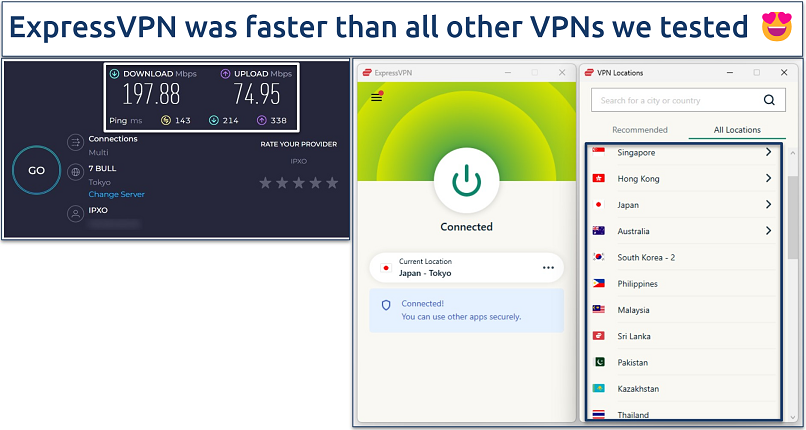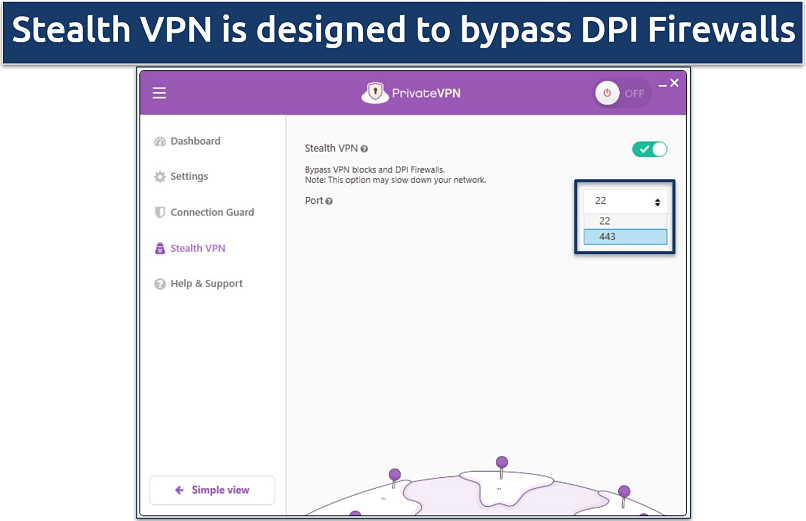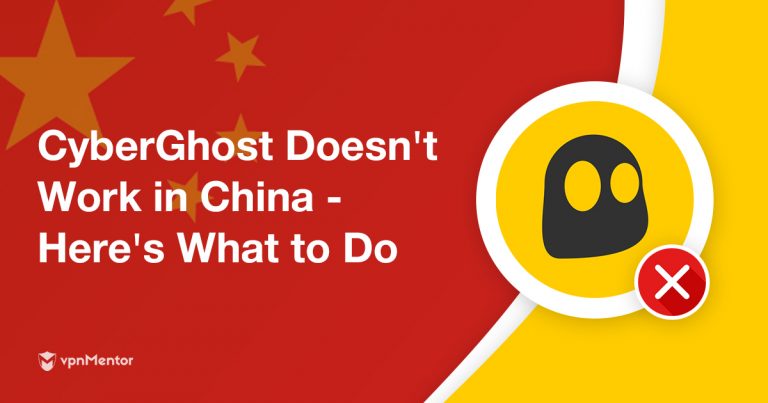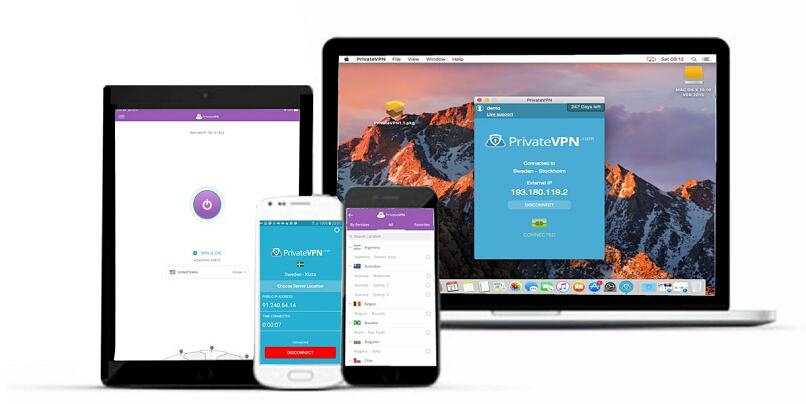Does CyberGhost Work in China? No, But Here’s a Fix (2025)
- Quick Guide: How To Use a VPN in China in 3 Easy Steps
- Why Doesn’t CyberGhost Work in China?
- Best CyberGhost Alternative VPNs for China in 2025
- Our Methodology for Testing VPNs for China
- How To Download a VPN When You’re Already in China?
- Is Your VPN Not Working in China? Here's What to Do
- FAQs on CyberGhost Alternative VPNs for China
- Get the Best VPN for China
CyberGhost no longer reliably works in China to safely access services like Gmail, WhatsApp, and banking apps. The Great Firewall of China (GFW) has become increasingly sophisticated at detecting and blocking VPN traffic, rendering CyberGhost ineffective.
State-approved VPNs are available, but on the stipulation that they provide the Chinese government with 100% user data. Fortunately, there are alternative VPNs that are dependable for use in China. They are independently run in countries outside China and, as such, are not obligated to hand over your data. That way, anyone visiting or moving to China can still safely access their favorite global sites and apps.
After we tested 50+ VPNs, I found ExpressVPN to be the most secure and reliable option for China. Its automatic obfuscation allows it to work effectively even in China, while its fast servers minimize speed loss. It even has a 30-day money-back guarantee* so that you can test it in China without financial risk.
Quick Guide: How To Use a VPN in China in 3 Easy Steps
- Download a VPN.
It's easiest to do this before arriving in China since the GFW blocks VPN websites. ExpressVPN is my top choice, offering solid security and fast speeds. - Connect to a server.
I recommend a server nearby, for example, in Macau. Because it’s in China, you’ll get better speeds without being subjected to the GFW or government surveillance. - Start browsing.
You can now safely visit central Asian or global websites and services like those in the US, UK, or Australia.
Why Doesn’t CyberGhost Work in China?
CyberGhost doesn’t work in China because the Great Firewall blocks its servers and VPN protocols. The Chinese government uses deep packet inspection (DPI) to detect and disrupt VPN traffic, preventing connections to censored foreign services.
Some VPNs use advanced obfuscation to disguise their traffic as regular HTTPS activity to get around this. CyberGhost relies on standard VPN technologies that the Great Firewall can easily detect. As a result, users in China struggle to connect, and even if they do, the connection is often unstable and slow.
Best CyberGhost Alternative VPNs for China in 2025
1. ExpressVPN — Automatic Obfuscation on Every Server for Reliable Access to Global Content From China

Tested July 2025
| Nearby Server Locations | Macau, Hong Kong, Bhutan, India, Kazakhstan, Laos, Mongolia, Myanmar, and more |
|---|---|
| Standout Feature | Automatic obfuscation on every server to avoid detection |
| Security | Your online identity is kept private with military-grade encryption and IP/DNS leak protection |
| Works With | WhatsApp, Google, Gmail, YouTube, Facebook, Instagram, X (Twitter), and more |
Unlike other VPNs, which only offer obfuscation on select servers, ExpressVPN's entire network of servers in 105 countries disguises VPN traffic as regular HTTPS traffic. This allows it to maintain reliable access to international websites and apps inside China. We had no problem using Google, Facebook, and WhatsApp, even when other VPNs were instantly detected and blocked.
Its proprietary Lightway protocol also provided the best speeds throughout our testing period. We averaged 197.88Mbps testing its Tokyo servers — just a 7% reduction from our 212.13Mbps base speeds. This made it possible to make video calls and even play online games without lag.
 ExpressVPN gives you multiple server options close to China for faster speeds
ExpressVPN gives you multiple server options close to China for faster speeds
ExpressVPN provides multiple mirror sites that work in China, making it easy to download the app when you’re already in the country. I confirmed that these mirror links work through contacts in Shanghai and Beijing. Its 24/7 live chat support can help you quickly troubleshoot any download issues.
The only downside is that its prices can be slightly higher than other VPNs. However, you can save with ExpressVPN's long-term offers. You can also try it risk-free since it offers a 30-day money-back guarantee. I tested the refund process through live chat and got my money back within 5 days.
Useful Features
- Threat Manager. Enable this feature to block trackers and malicious sites that could expose your data. It’s handy for keeping your browsing private and secure while in China.
- Perfect Forward Secrecy. This encryption system enhances security by changing your encryption keys frequently, keeping past and future internet activity secure even if a key is compromised.
- Network Lock. Enabling ExpressVPN’s kill switch protects your data even if the VPN connection drops unexpectedly. This is crucial in China, where momentary VPN disconnections could expose your real IP address and browsing activity to surveillance.
- TrustedServer technology. ExpressVPN uses RAM-only servers, which automatically wipe all data when rebooted. This means it doesn’t have any logs of your online activity to hand over to Chinese authorities if requested.
- One of the fastest VPNs
- Works with top streaming sites
- A proven no-logs policy
- Limited customization
- Smart Location isn't always the fastest
2. Astrill VPN — China-Optimized Servers for Private Connections Within the Country
| Nearby Server Locations | Hong Kong, Taiwan, India, Singapore, South Korea, Thailand, and Vietnam |
|---|---|
| Standout Feature | SuperCharged servers in the US, Hong Kong, Taiwan, and Singapore |
| Security | Stay anonymous online with a kill switch that cuts your internet connection should the VPN drop |
| Works With | WhatsApp, Google, Gmail, YouTube, Facebook, Instagram, X (Twitter), and more |
Thanks to their advanced stealth technology, Astrill VPN’s Supercharged servers are specifically designed and tested to work within China. They use Stealth VPN technology to make it difficult for firewalls using deep packet inspection to detect and block. During our tests, these servers consistently accessed global services without disconnection issues.
 Activate the adblocker to remove annoying pop-ups and banner ads
Activate the adblocker to remove annoying pop-ups and banner ads
I like Astrill VPN’s website and app filter, which allows you to selectively route traffic through the VPN while keeping other activities on a direct connection. I found it helpful in maintaining fast speeds when accessing local websites and apps that don’t require a VPN. Instead of slowing down your entire connection, you can choose which websites or apps use the VPN, helping reduce unnecessary lag.
Astrill VPN logs some connection data (connection time, IP address, and device type), which is a bit concerning. However, all data is deleted immediately after disconnecting from the Astrill VPN server, so this shouldn’t worry you. Additionally, the VPN has its headquarters in the Seychelles, which isn’t part of the 5/9/14 Eyes Alliance (a group of countries that share data).
Unlike most ExpressVPN, Astrill VPN doesn’t have a money-back guarantee. However, it offers a 7-day free trial, which you can use to test the VPN in China and see how it works for you.
Useful Features
- App Guard. Enabling App Guard automatically blocks specific apps from accessing the internet without VPN protection. This prevents accidental data exposure if your VPN connection drops or you forget to connect.
- Streaming support. It's possible to securely access popular streaming platforms like Netflix and Amazon Prime Video with Astrill VPN.
- SecureVPN. Astrill VPN's SecureVPN feature allows users to establish an SSL/TLS connection, providing an extra layer of encryption and security for sensitive data.
- Works in China
- Privacy-friendly
- High price
- Slow speeds
3. PrivateVPN — Advanced Security Options to Protect Your Data in China
| Nearby Server Locations | Hong Kong, Taiwan, Japan, South Korea, Singapore, and Vietnam |
|---|---|
| Standout Feature | Strong, adjustable security settings to customize your connection |
| Security | AES 256-bit encryption and a no-logs policy for secure and private Internet access |
| Works With | WhatsApp, Google, Gmail, YouTube, Facebook, Instagram, X (Twitter), and more |
PrivateVPN offers several advanced security settings that allow you to tailor your protection level in China. You can switch between different encryption levels and protocols to give you more options for reliably connecting in China. Our tests showed that OpenVPN with Stealth Mode provided the most stable connection.
Stealth Mode is an obfuscation feature designed to make VPN connections look like regular ones. It allows you to access international platforms and services in China safely. Stealth VPN scrambles VPN traffic and makes it indistinguishable from regular traffic to enjoy an unrestricted internet experience in China.
 Stealth VPN also lets you change ports for more enhanced obfuscation
Stealth VPN also lets you change ports for more enhanced obfuscation
Unfortunately, PrivateVPN doesn't support mirror site downloads, which can be problematic if you need to download it after arriving in China. However, you can easily avoid this by installing the VPN before entering the country. You can try PrivateVPN for free in China with its 30-day money-back guarantee to determine if it works well for your needs.
Useful Features
- Intuitive apps. PrivateVPN’s simple interface packs powerful customization options under the hood. While the default settings work well, advanced users can fine-tune connection parameters like port selection and proxy settings.
- Cryptocurrency payments. For enhanced privacy in China, PrivateVPN, like ExpressVPN, lets you pay anonymously using Bitcoin and other cryptocurrencies.
Our Methodology for Testing VPNs for China
When testing VPNs for use in China, we focused on key factors that impact your online experience in this highly restrictive environment. Our evaluation began with assessing whether a VPN reliably works in China and remains undetected. We then reviewed its security and privacy features and measured connection speeds and stability. Additionally, we examined server availability, prioritizing options within China and nearby regions for optimal performance.
Tips on How To Choose the Best VPN for China
- Works in China. The GFW blocks a long list of websites, apps, and services, including independently run VPNs. The best China VPN should have no problem maintaining stable and secure connections to international websites from China.
- Mirror websites. It’s advisable to go for a VPN that maintains mirror sites that work in China. This is important if you need to download the VPN app while in the country.
- Obfuscation technology. Look for VPNs with built-in obfuscation or stealth features that mask VPN traffic as regular internet traffic. This is essential for reliably accessing global services from China.
- Server locations. The more servers a VPN has in China and nearby countries, the better its performance will be. Look for a VPN with servers in Hong Kong, Taiwan, or Singapore, as they are close to China and, therefore provide better speeds and stability.
- Encryption and security. It is essential to choose a VPN that offers strong encryption and security. To enhance your online privacy, consider a VPN with features like a kill switch and DNS leak protection.
- Protocols. Some protocols, such as PPTP and L2TP, are less secure, and the GFW can easily detect and block them. Choose a VPN with protocols like OpenVPN, IKEv2, or WireGuard, as these are more secure.
- Speed. A fast VPN is crucial for keeping your online activities smooth. Choose a VPN with fast and stable speeds, especially when connecting to servers outside of China — the GFW limits speeds on sites from outside of the country, as it is.
- Customer support. When using a VPN in China, you may encounter technical issues or have questions about the service. Look for a VPN that offers 24/7 customer support through live chat, email, or phone. Also, consider a VPN with a comprehensive knowledge base or FAQ section.
- Money-back guarantee or free trial. Pick a VPN with a money-back guarantee or a free trial to test if it works in China.
How To Download a VPN When You’re Already in China?
Most VPN websites are blocked in China, so downloading VPNs from within the country isn’t straightforward. If you're already in China without a VPN, these are some potential ways to get one:
- Use mirror websites. ExpressVPN and Astrill VPN maintain mirror sites (alternative sites with different URLs) that work in China. Save these URLs before traveling, or get them from a friend outside China.
- Contact support via email. Most major VPN providers offer alternative ways to download their apps. Email their support team for direct download links.
- Use international roaming. If you have a foreign SIM card with roaming, it might be possible to use it to download a VPN.
- Ask someone outside China. Have a friend download the installation files and send them to you through a file-sharing service that works in China.
Is Your VPN Not Working in China? Here's What to Do
The Chinese government is known for enforcing strict rules related to internet censorship, and it's not uncommon for the Great Firewall (GFW) to block VPN services. If you have any issues connecting to a VPN server while in China, here are some possible fixes you can try.
- Change servers. This is often the easiest solution when you’re having issues with your VPN. Try reconnecting to a different server or changing locations to a nearby country like Hong Kong or Taiwan, as these locations provide good performance.
- Change protocol. If changing servers doesn't work, try changing your VPN protocol. Some VPN protocols, such as PPTP and L2TP, are known to be less secure. Try switching to a more reliable protocol like OpenVPN or IKEv2.
- Check for updates. VPN providers often release software updates to help their services work more effectively in China. These updates may include improvements that allow you to access websites and services in the country.
- Contact customer support. Reach out to your VPN provider's customer support team. They can help troubleshoot the issue or provide guidance on how to get their service to work reliably in China.
- Consider alternative VPNs. If all else fails, consider using a different VPN. Not all VPNs work in China. Look for VPNs with a good track record of working in the country. Check if they offer a money-back guarantee in case the service doesn't work properly.
FAQs on CyberGhost Alternative VPNs for China
Why do I need to use a VPN in China?
China's strict internet controls make a VPN essential for unrestricted internet access. The government monitors online activity and blocks access to many websites and apps. A reliable VPN encrypts your traffic and routes it through servers outside China, allowing secure access to international content.
That said, it's important to remember that there are regulations surrounding VPN use in China. You should always check up on the most recent local laws to ensure you don't get into trouble accidentally. My team and I don’t condone any illegal activities.
Should I use a VPN in Hong Kong, Macau, and Taiwan?
Using a VPN in these regions is increasingly important due to growing internet restrictions. Traditionally, Hong Kong, Macau, and Taiwan had more open internet access than mainland China. However, recent political changes have led to increased surveillance and content blocking. Using a VPN adds a crucial layer of privacy protection for your online activities in these countries.
Are VPNs illegal in China?
The use of unauthorized VPNs is prohibited in China. China has been tightening its grip on internet censorship and cracking down on VPNs that don’t comply with its regulations. So, getting a reliable VPN for China before you travel there is best. State-approved VPNs like Shadowrocket are available in China, but the government will monitor your data through these.
That said, there are no public reports of a tourist being fined or prosecuted for using a VPN in China. Be sure to research any VPN’s privacy policy thoroughly, though, and understand the risks before using it in China.
Why is my VPN so slow in China?
The Great Firewall of China slows down VPN traffic by blocking certain VPN protocols. PPTP and L2TP, for example, are less secure and highly susceptible to detection and blocking. Switching to a more secure protocol like OpenVPN, IKEv2, or ExpressVPN’s exclusive Lightway can help improve your speeds.
You may also consider using local Chinese versions of the sites you usually visit. Domestic speeds are much faster than those from outside China. The GFW puts heavy restrictions on traffic from outside the country.
Another reason for slow VPN speeds in China is network congestion. China is home to more than a billion internet users. Such a high number can cause network congestion and slow internet speeds, including VPN traffic. Connecting to a VPN server close to your physical location can help improve your speed.
Can I use a proxy in China?
While some proxies work in China, they're less secure than VPNs. Proxies don't encrypt your traffic, leaving your data vulnerable to surveillance. They're also easier for the Great Firewall to detect and block. A premium VPN with strong encryption and obfuscation provides much better protection and reliability.
Does CyberGhost have any servers in China?
Yes, CyberGhost has 12 servers in Shenzhen. So, while it no longer works reliably from within China, it’s a good choice if you’re traveling outside the country and want access to Chinese websites securely. VPNs with advanced security features, such as obfuscation, are usually the most reliable options for use in China.
Can I use a free VPN in China?
Free VPNs are not reliable for use in China. They lack the advanced features needed to work in China, such as obfuscation and regularly updated protocols. Most free VPNs are easily blocked, offer poor speeds, and may compromise your privacy by selling your data. Go for a premium VPN with the right set of features for browsing in China without restrictions.
Get the Best VPN for China
CyberGhost is one of the best VPNs, offering fast speeds and robust security, but unfortunately, it no longer works within China. If you are visiting China and want to access global websites and services safely and freely, you need an alternative. Thankfully, a few VPNs still work reliably within the country.
My number one VPN alternative for China is ExpressVPN. Its automatic obfuscation reliably hides your VPN traffic while offering strong privacy protection. Its fast speeds are ideal for minimizing speed loss and keeping your connections smooth. You can test ExpressVPN risk-free since it provides a 30-day money-back guarantee. If it’s not for you, claiming a refund is straightforward.
Your online activity may be visible to the sites you visit
Your IP Address:
216.73.216.135
Your Location:
US, Ohio, Columbus
Your Internet Provider:
Some sites might use these details for advertising, analytics, or tracking your online preferences.
To protect your data from the websites you visit, one of the most effective steps is to hide your IP address, which can reveal your location, identity, and browsing habits. Using a virtual private network (VPN) masks your real IP by routing your internet traffic through a secure server, making it appear as though you're browsing from a different location. A VPN also encrypts your connection, keeping your data safe from surveillance and unauthorized access.
Leave a comment
Im in china right now, have been with cyberghost for over 10 years, it always worked. you are lying. I use all 3 protocols available as a choice, and it all works. on some android smartphones it just wont connect, not sure why, but on the windows pc, windows 11, it works. I am streaming youtube fast, the problem is I cannot share the internet, I try sharing the connection and I get an error, once the vpn is on. so I cannot activate a wifi hotspot, the trusted windows function of many years, mobile hotspot, will just not share an internet connection. cyberghost works. you are just using this piece of fluff here, to product place and advertise this other service. cheap shot
Hi there,
Thanks for sharing your experience! VPN performance can vary depending on location, device, and network conditions, so we’re glad to hear CyberGhost is working well for you in China on your Windows PC.






Please, comment on how to improve this article. Your feedback matters!